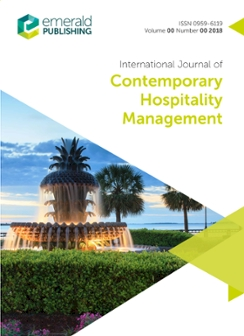Table of contents
The cyclical effect of advertising: Is reducing restaurant advertising appropriate in periods of economic contraction?
Kwangmin Park, SooCheong (Shawn) JangThe purpose of this paper is to provide an understanding of the effects of advertising based on economic cycles. To comprehend advertising effects in the restaurant industry from…
Understanding the normative expectations of customers toward Buddhism-themed hotels: A revisit of service quality
Kam Hung, Sha Wang, Chaohua TangThis study aims to understand the normative expectations of travelers on the services and experiences provided by Buddhism-themed hotels as well as how service providers perceive…
A multidimensional model of marketing culture and performance: A different approach to the use of Webster’s marketing culture measurement scale
Mamoun N. Akroush, Samer M. Al-Mohammad, Abdelhadi L. OdetallahThe purpose of this paper is to examine a multidimensional model of marketing culture and performance in tourism restaurants operating in Jordan. The paper introduces a model…
Enhancing the employer-employee relationship through corporate social responsibility (CSR) engagement
Daraneekorn Supanti, Ken Butcher, Liz FredlineThe purpose of this study is to understand how hotel managers perceive the benefits that may accrue to employees and hotels through their engagement in corporate social…
General managers’ environmental commitment and environmental involvement of lodging companies: The mediating role of environmental management capabilities
Hyun Jeong Kim, Jeongdoo Park, Ji WenThe purpose of this paper is to test links from hotel general managers’ (GMs’) environmental commitment to hotel companies’ environmental management capabilities and then to hotel…
A new forecasting approach for the hospitality industry
Oscar Claveria, Enric Monte, Salvador TorraThis study aims to apply a new forecasting approach to improve predictions in the hospitality industry. To do so, the authors developed a multivariate setting that allows the…
The role of work-to-leisure conflict in promoting frontline employees’ leisure satisfaction: Examining the job demand-control-support model
Jo-Hui Lin, Jehn-Yih Wong, Ching-hua HoThis paper aims to examine a mediating model of work-to-leisure conflict (WLC) based on the job demand-control-support model (JDCS model) and conflict roles of work and non-work…
Internet marketing research in hospitality and tourism: a review and journal preferences
Xi Yu Leung, Lan Xue, Billy BaiThe purpose of this study is to provide a progress review of published Internet marketing research within the top eight hospitality and tourism journals and to provide suggestions…
How online search behavior is influenced by user-generated content on review websites and hotel interactive websites
Ángel Herrero, Héctor San Martín, José M. HernándezThe purpose of this paper is to advance in research on consumer psychology of hospitality, since it investigates how online search behavior of users (particularly, information…
The perceived effectiveness of social couponing campaigns for hotels in Italy
Fabio Cassia, Francesca Magno, Marta UgoliniThe purpose of this paper is to analyze the effectiveness of social couponing campaigns for hotels. In particular, the perceived effectiveness related to four specific objectives…
Investigating relationships between internal marketing practices and employee organizational commitment in the foodservice industry
Hyun-Woo Joung, Ben K. Goh, Lynn Huffman, Jingxue Jessica Yuan, James SurlesThe purpose of this study is to investigate the relationships between internal marketing practices, employee job satisfaction, organizational commitment and turnover intention in…
Proactive and reactive strategies deployed by restaurants in times of crisis: Effects on capabilities, organization and competitive advantage
María del Mar Alonso-Almeida, Kerstin Bremser, Josep LlachThis study aims to examine the development of dynamic capabilities and their effect on the competitive advantage of restaurants in 2009, one year after the beginning of the global…
Restaurant brand pages on Facebook: Do active member participation and monetary sales promotions matter?
Juhee Kang, Liang (Rebecca) Tang, Ann Marie FioreThe purpose of this paper is to investigate the impact of members’ active participation in customer–brand relationships, considering brand trust and brand commitment in an online…
“LuXurY” hotel loyalty – a comparison of Chinese Gen X and Y tourists to Macau
Fiona X. Yang, Virginia M.C. Lau– This study aims to investigate generational disparities of Chinese Generation (Gen) X and Y tourists by examining their loyalty determinants in a luxury hotel setting.
Types of organizational innovativeness and success in Austrian hotels
Alexander Kessler, Christoph Pachucki, Katharina Stummer, Michael Mair, Petra BinderThe purpose of this paper is to identify different types of organizational innovativeness in Austrian hotels and analyze their connection to (innovation) success. In the face of…
The role of servicescape and image perceptions of customers on behavioral intentions in the hotel industry
Ufuk Durna, Bekir Bora Dedeoglu, Sevgi Balikçioglu– The purpose of this study is to examine the relationships between servicescape components, image and behavioral intentions within the framework of hotel businesses.

ISSN:
0959-6119Online date, start – end:
1989Copyright Holder:
Emerald Publishing LimitedOpen Access:
hybridEditor:
- Prof Fevzi Okumus